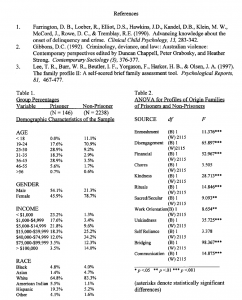Matthew N. I. Oliver and Professor Shirley Klein, Family Sciences
Past research on families consistently indicates that parents of delinquents are usually poor managers of income (1), and likely to use excessively lax or excessively strict discipline (2). Although much is known about the families of juvenile delinquents, little research has been done on adult offenders’ families of origin. The purpose of this study is to explore family of origin profiles of prisoners and non-prisoners and evaluate how those differences relate to the profile of juvenile delinquents’ family of origin. More specifically, this study explores the following hypotheses:
Hypothesis 1: Non-prisoners’ families of origin will reflect more fictional financial management skills and more favorable attitudes towards work than will prisoners’ families of origin.
Hypothesis 2: Prisoners’ families of origin will reflect more extreme modes of parental control or more passive modes of parental supervision than will non-prisoners’ families of origin.
The total sample consisted of 2,384 participants. Non-prisoner participants were selected from various universities in the United States and Europe. University students were recruited through social science introductory courses to participate in this study. Prisoner participants were recruited from medium security facilities at the Utah State Prison. Table I compares the collected group demographic characteristics of prisoners and non-prisoners.
The Family Profile II is a 58-item self-report survey. Participants were asked to complete the survey in terms of how they perceived their family situation when they were approximately 17 years of age. The Family Profile II includes subscales of Kindness, Unkindness, Communication, Disengagement, Enmeshment, Social Bridging, Financial Management, Work Orientation, Chore Orientation, Family Rituals, Sacred/Secular Orientation, and Self Reliance (3).
An analysis of variance (ANOVA) showed statistically significant differences between prisoners’ and non-prisoners’ families of origin (see Table 2). Prisoners’ families of origin were less likely to have fictional financial management skills and more likely to have unfavorable attitudes towards work than were non-prisoners’ families of origin, supporting Hypothesis 1. Furthermore, prisoners’ families of origin were more likely to be rated as enmeshed or disengaged than were non-prisoners’ families of origin, supporting Hypothesis 2.
The present study suggests that there are definite profile differences between prisoners’ and non-prisoners’ families of origin. Furthermore, the differences found between adult prisoners’ and non-prisoners’ families of origin share similarities with the differences found between families of juvenile delinquents and those of non-juvenile delinquents.

